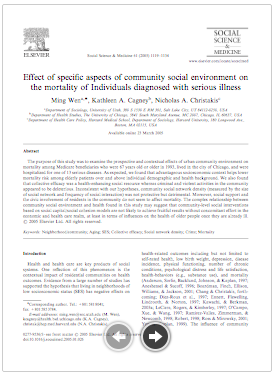
Effect of Specific Aspects of Community Social Environment on the Mortality of Individuals Diagnosed with Serious Illness
Abstract
The purpose of this study was to examine the prospective and contextual effects of urban community environment on mortality among Medicare beneficiaries who were 67 years old or older in 1993, lived in the city of Chicago, and were hospitalized for one of 13 serious diseases. As expected, we found that advantageous socioeconomic context helps lower mortality risk among elderly patients over and above individual demographic and health background. We also found that collective efficacy was a health-enhancing social resource whereas criminal and violent activities in the community appeared to be deleterious. Inconsistent with our hypotheses, community social network density (measured by the size of social network and frequency of social interaction) was not protective but detrimental. Moreover, social support and the civic involvement of residents in the community do not seem to affect mortality. The complex relationship between community social environment and health found in this study may suggest that community-level social interventions based on social capital/social cohesion models are not likely to achieve fruitful results without concomitant effort in the economic and health care realm, at least in terms of influences on the health of older people once they are already ill.
Citation:
M. Wen, K.A. Cagney, and N.A. Christakis, "Effect of Specific Aspects of Community Social Environment on the Mortality of Individuals Diagnosed with Serious Illness" Social Science and Medicine, 61(6): 1119-1134 (September 2005)